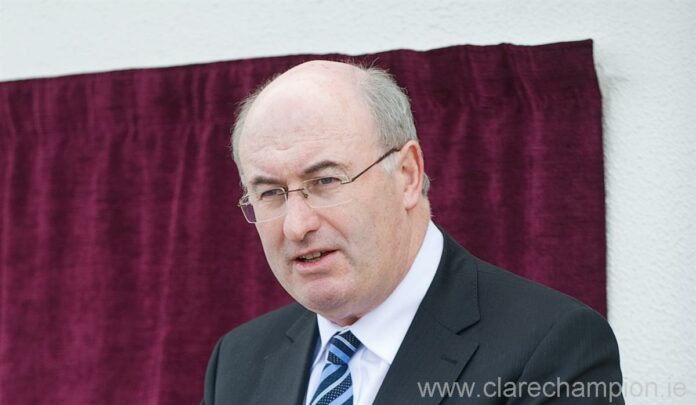Speaking at a Shannon Chamber organised event last Friday, Minister Phil Hogan claimed credit for making changes to local government, and staunchly defended the establishment of Irish Water.
Regarding changes to local authorities, he said, “We have in difficult times, and in difficult political times for myself, brought about the most radical reform of local government in 100 years.”
While there has been criticism, not least in Clare, of his move to bring Local Development Companies under the auspices of county councils, he said it is the right move.
“It’s not acceptable that 29% of the money that I give out in the social inclusion measures that are essential for frontline services and communities are spent on administration. We have to reduce that. We also want to ensure that we have greater financial autonomy and greater financial management in relation to the money that we give and we’re going to do that through an existing public service organisation called local government, who have directors of finance and existing staff that can process and manage applications and pay out the necessary contributions and grants, without having to enlist any more cost in doing so, because the staff are already there.”
He said certain sources have tried to put out misinformation “that we’re going to abandon and effectively demolish the community structures that have been built up over the last 20 years. We’re going to do nothing of the sort.”
He said the councillors who are elected in this Friday’s local elections will have a lot more power than has been the case in recent decades.
“Devolution of responsibility is critically important. My late father was a councillor for 27 years, he had more power in the 1960s and ’70s to deal with local priorities than I had in the 1980s and ’90s (when the younger Hogan also served as county councillor). I’m reversing that, I’m going back to giving local councillors more responsibility and more power in order to meet the competing choices and demands and be able to adjudicate on those in the cases of competing priorities for you at local level.”
The minister defended Irish Water, claiming that it will not be overstaffed.
“Irish Water is going to be a lean and efficient organisation, they’re going to work to service level agreements with local authorities in a cost-effective way and they will be reviewed every two years. We will not be passing on the charge to a bloated organisation; that will not happen.”
Irish Water, which the minister insisted several times will not waste money, spent €6,000 sending employees on a laughing yoga course.
When it was reported earlier this year it was hard not to be angry at a seemingly indefensible waste of money and when questioned about it after his address, Minister Hogan acknowledged a four-figure sum shouldn’t have been spent in such a ludicrous way. “That was badly expended money, definitely. I hope that they’ve learned from that bad experience.”
Regarding the staffing of Irish Water, he claimed its numbers aren’t too high.
“I read all these people saying that we have too many people dealing with Irish Water through the local government system. These are the same people who are local authority staff, 4,300 of them nationally, we have 2,000 water and wastewater plants. Does it mean that we should abandon the caretakers for all of those plants and that if you have a problem as a small business person on a Saturday or Sunday, you shouldn’t have someone accessible to you to fix the particular leak or problem to allow your business to go on? Let’s recognise that the knowledge and expertise that has been built up in the local authority sector is essential for the continuation of good business practice with Irish Water.”
Speaking after his address to the meeting, the minister said he hopes to shortly see advances in repair works following on from the storms at the start of the year. “There’s work going on there at the moment, there’s tendering out in relation to the major project that will have to be done at Strand Line in Kilkee. There’s €16.2 million allocated to Clare and they’re getting on with it at this stage. Because of the difficulties with tendering and Special Areas of Conservation, it has to go through the statutory process.
“Hopefully, it’ll be done as soon as possible,” he said.
By Owen Ryan
A native of Ennis, Colin McGann has been editor of The Clare Champion since August 2020. Former editor of The Clare People, he is a journalism and communications graduate of Dublin Institute of Technology.


